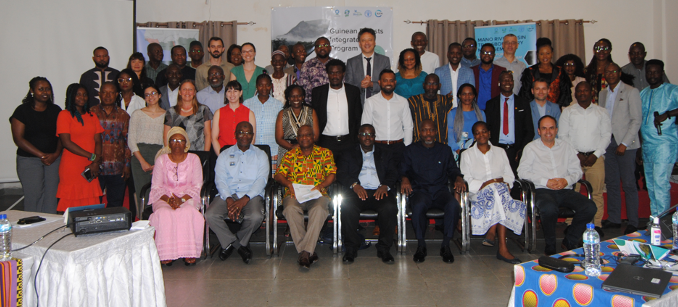
CI-GEF holds validation workshop for the Guinean Forests Integrated Program
December 17, 2023
The workshop began with a recognition of the urgent need for environmental preservation, considering the threats of deforestation, biodiversity loss, and climate change. The GEF-8 Guinean Forests Regional Coordination Project, led by Conservation International (CI), aims to address these challenges through a whole-of-biome approach, engaging state and non-state actors in West Africa to protect and govern the Guinean Forests. The workshop specifically focused on validating the draft project document.
Key Points
Work Overview:
The Guinean Forests Integrated Program, led by CI, was selected by the Global Environment Facility (GEF) to engage countries like Guinea, Liberia, and Sierra Leone in transboundary forest governance and watershed management.
The GEF-8 Guinean Forests Regional Coordination Project, aims to enhance transboundary governance through a coordinated programmatic approach, including knowledge sharing, capacity building, policy harmonization, sustainable financing, and innovation.
The primary goal of the workshop was to validate the draft project document of the GEF-8 Guinean Forests Regional Coordination Project.
Methodology:
The workshop followed Terms of Reference (ToR) to ensure active participation, knowledge exchange, and constructive discussions. Key stakeholders, including government agencies, environmental experts, local communities, NGOs, and others, were invited to contribute to discussions guided by the ToR. Presentations, plenary sessions, and discussions were conducted, and data sources included scientific studies, reports, and local knowledge.
Keynote Statement:
The workshop featured a keynote address by Hon. Jiwoh Emmanuel Abdulai, Minister of Environment and Climate Change in Sierra Leone, a recognized authority in environmental conservation. The Minister highlighted the exceptional biodiversity of the Upper Guinean Forests, its global significance, and the need for collaborative efforts to address threats, integrate climate change challenges, and reconcile conservation with improved livelihoods.
The Minister's speech underscored the workshop's focus on biodiversity conservation, global and regional significance, threatened ecosystems, conservation-livelihood balance, climate change mitigation, collaboration, and the legacy of conservation.
Feedback and Response:
Following the Minister's address, participants engaged in discussions, expressing enthusiasm for the commitment made by the Ministry of Environment and Climate Change. Recommendations and action plans were discussed with renewed vigor, highlighting the workshop's significance in fostering collaboration and shared responsibility.
In conclusion, the Regional Design and Validation Workshop served as a platform for meaningful discussions and collaboration among stakeholders, guided by a shared commitment to preserving the Guinean Forests and ensuring a sustainable future for the region.
*Watch a recap of the event HERE*
Key Points
Work Overview:
The Guinean Forests Integrated Program, led by CI, was selected by the Global Environment Facility (GEF) to engage countries like Guinea, Liberia, and Sierra Leone in transboundary forest governance and watershed management.
The GEF-8 Guinean Forests Regional Coordination Project, aims to enhance transboundary governance through a coordinated programmatic approach, including knowledge sharing, capacity building, policy harmonization, sustainable financing, and innovation.
The primary goal of the workshop was to validate the draft project document of the GEF-8 Guinean Forests Regional Coordination Project.
Methodology:
The workshop followed Terms of Reference (ToR) to ensure active participation, knowledge exchange, and constructive discussions. Key stakeholders, including government agencies, environmental experts, local communities, NGOs, and others, were invited to contribute to discussions guided by the ToR. Presentations, plenary sessions, and discussions were conducted, and data sources included scientific studies, reports, and local knowledge.
Keynote Statement:
The workshop featured a keynote address by Hon. Jiwoh Emmanuel Abdulai, Minister of Environment and Climate Change in Sierra Leone, a recognized authority in environmental conservation. The Minister highlighted the exceptional biodiversity of the Upper Guinean Forests, its global significance, and the need for collaborative efforts to address threats, integrate climate change challenges, and reconcile conservation with improved livelihoods.
The Minister's speech underscored the workshop's focus on biodiversity conservation, global and regional significance, threatened ecosystems, conservation-livelihood balance, climate change mitigation, collaboration, and the legacy of conservation.
Feedback and Response:
Following the Minister's address, participants engaged in discussions, expressing enthusiasm for the commitment made by the Ministry of Environment and Climate Change. Recommendations and action plans were discussed with renewed vigor, highlighting the workshop's significance in fostering collaboration and shared responsibility.
In conclusion, the Regional Design and Validation Workshop served as a platform for meaningful discussions and collaboration among stakeholders, guided by a shared commitment to preserving the Guinean Forests and ensuring a sustainable future for the region.
*Watch a recap of the event HERE*